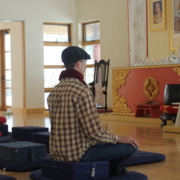The Top 10 Scientific Benefits of Gratitude
Matt O’Grady
Gratitude–a state of thankfulness–is not a new concept. Ancient texts and scriptures highlight the importance of this unique human emotion in contributing to the richness of our communities, families and inner lives. As Plato pointed out over 2,000 years ago:
“A grateful mind is a great mind, which eventually attracts itself to great things.”
In the past 20 years, scientists and psychologists have really buckled down to examine the measurable scientific benefits of gratitude. What they’ve discovered will change your life. It turns out, feeling grateful isn’t just a self-help cliché. The practice of gratitude actually produces myriad mind blowing benefits that extend from our psychological to physiological well-being.
As a disabled veteran, I was badly suffering from depression and pain after my medical discharge. I attribute so much of my subsequent healing and improved well-being to a daily gratitude practice. Gratitude has been the gift that keeps on giving in my life.
I’ve compiled a list of the top 10 scientific benefits of gratitude, so you can experience the transformative effects of this simple but powerful emotion.
- Gratitude Has Positive Lasting Effects on the Brain
When a person feels the positive emotions of gratefulness, their brain structure actually changes. First, the medial prefrontal cortex of the brain lights up, which is responsible for feelings of reward, morality, social connections and the ability to recognize positive things and experiences. Gratitude actually creates new neural pathways in these zones. Repeated practice of it strengthens our ability to revisit positive experiences and their emotional benefits over time.
In other words, the more you practice gratitude, the easier it will be to enter a grateful state of mind.
2. Gratitude Boosts the Immune System
Feeling grateful for the circumstances in our lives, through the ups and downs, increases our optimism about our present and future. Immunology is now revealing that optimism boosts our immunity by increasing our red blood cell count. Researchers at the universities of Kentucky and Utah found that certain law students under stress who indicated higher levels of optimism had more disease-fighting cells in their bodies. In addition to these fortifying cells, thankfulness promotes better sleep and lower levels of stress, two key factors in healthy immune function.
- Gratitude Reduces Stress, Anxiety and Depression
We already know that on a neurological level, gratitude alters the structure of the brain and activates useful emotional zones in the prefrontal cortex. But equally as amazing is gratitude’s effect on the body’s physiology. When we feel grateful, and activate those healing emotions of positivity and optimism, our brain releases a surge of those feel-good chemicals and hormones like dopamine, serotonin and oxytocin. These surges enhance mood and ease anxiety.
There is even evidence that a sustained gratitude practice abates the symptoms of clinical depression and PTSD over time. In conjunction with professional services or medications, incorporating thankfulness as a daily habit can operate like a natural antidepressant–and it’s available to everyone.
- Gratitude Promotes Long Lasting Happiness.
Feeling grateful for what we have promotes feelings of optimism and positivity. When we are able to see our situation in a positive light, negative thoughts will start to fall away. And as we express gratitude, the pervasive negative thinking that plagues many of our minds abates. The more we practice appreciating our lives, the easier it will become to feel content long term no matter what situations arise. It’s a pretty simple way to powerfully experience more happiness.
- Gratitude Creates and Strengthens Relationships
Gratefulness does so much for our inner lives. But it doesn’t stop there. Studies show that when we are feeling grateful, it benefits everyone around us. We are much more inclined to want to spread that positivity to others, be more generous and display our gratitude. Our empathy is enhanced. This promotes new social bonds, strengthens the relationships we already have and is even shown to make us more prosocial in future interactions.
- Gratitude Reduces Chronic Pain
Does this one surprise you? It sounds almost too good to be true, but various studies on the physical effects of gratitude are proving this. The Journal of Health Psychology published one such study where participants who expressed gratitude reported less inflammation, fatigue and anxiety. Also, the mental benefits of practicing more appreciation and positivity reduce physiological stress in the body–a significant cause of chronic pain.
- Gratitude Improves Our Sleep
Whether it’s intrusive, anxious thoughts or chronic pain keeping you up at night, feeling grateful before bed can help. According to Professor Robert Emmons, a leading expert in the psychology of gratitude and author of Thanks! How Practicing Gratitude Can Make You Happier, focusing on what you’re thankful for just a few minutes before bedtime can provide an extra 30 minutes of quality sleep. Relaxing our minds and reducing negative thinking calms the nervous system, allowing us to fully enter REM and get true restorative rest throughout the night.
- Gratitude Helps Us Live Mindfully
How often are we totally lost in our busyness, daily tasks and work stress? Most of us would like to believe we’re fairly positive and aware people. But the National Science Foundation reports that out of our 12,000 to 50,000 daily thoughts, roughly 80 percent of these are negative! And negative thinking takes us out of the joys of the present moment. We lose focus on all the good things sitting right under our noses. Developing the ability to notice the beauty around us and be thankful for our current situation brings us back to the present moment. In this way, we can be more mindful of our words, thoughts, relationships and choices.
- Gratitude Promotes Exercise and Healthy Habits
While many epidemiological studies on the connection between healthy living and gratitude are correlational, it’s very promising evidence. In general these studies show that people who regularly experience feeling grateful report less physical pain, and exercise more frequently. They also display better self-care habits like regular doctor’s visits and better nutrition. While we can still wonder whether the chicken came before the egg, this still shows that a gratitude practice feeds into a healthy, active lifestyle.
- Gratitude Improves Our Self Esteem
Gratitude has an almost magical ability to boost our own self esteem and sense of self worth. That’s because it takes us out of a scarcity mindset, where we never feel like we have enough. People who tend to get stuck in a scarcity mindset often feel like bad events and situations keep happening to them, or that the world is against them. But when we cultivate a thankful mindset, we start to notice the abundance around us. We begin to believe we’re worthy of happiness, love and joy.
And when we’re truly grateful, we recognize that we already have everything we need.
Most of us were taught as children to say “Thank you” to express our gratitude. And most of us understand that it’s good to be grateful for what we have. But the latest scientific evidence is now revealing that practicing gratitude on a daily basis is not only useful, but physically and psychologically transformative. When we unlock the power of gratitude we can access more vibrant health, peace of mind, limitless joy, and experience magnificent, beautiful moments in our lives.
About the Author:

Want to learn more? Find the book Living Gratitude: A Simple Path to Happiness by Matt O’Grady on Amazon. Or go to www.mattogradycoaching.com for more information.










Trackbacks & Pingbacks
[…] are many benefits to keeping a gratitude journal, especially when the winter blues settle in. Gratitude can […]
Comments are closed.